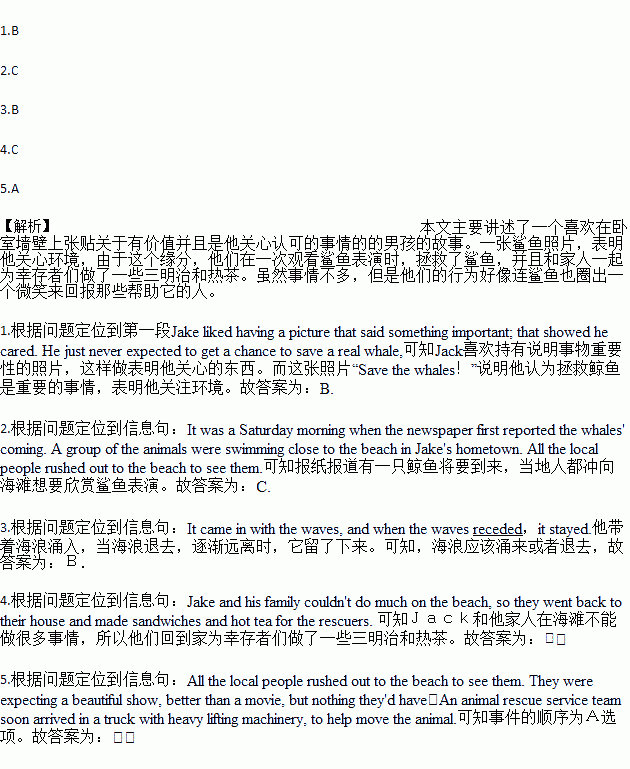题目内容
“Save the whales!” That's what the picture on Jake Smith's bedroom wall said. Jake liked having a picture that said something important; that showed he cared. He just never expected to get a chance to save a real whale, one right in his own neighbourhood.
It was a Saturday morning when the newspaper first reported the whales' coming. A group of the animals were swimming close to the beach in Jake's hometown. All the local people rushed out to the beach to see them. They were expecting a beautiful show, better than a movie, but nothing they'd have to do anything about.
Then one whale swam in their direction, directly towards land. It came in with the waves, and when the waves receded,it stayed. Its huge body rested on the sand. Suddenly, Jake and his family and all the others were no longer sightseers. They had to become rescuers. A few people ran towards the animal. They pushed and tried to force the whale back into the water, but it was no use.
An animal rescue service team soon arrived in a truck with heavy lifting machinery, to help move the animal. Jake and his family couldn't do much on the beach, so they went back to their house and made sandwiches and hot tea for the rescuers. At least, Jake thought, they could help in some way.
Back at the beach, they offered the food to the rescuers and were happy to see that it was needed. It was getting dark. Some people lined up their cars along the beach and shined the headlights on the sand. The rescuers would not give up. After trying many times they were finally able to lift the whale into the water. Everyone cheered when it headed out to sea. It swam out about a mile and then disappeared for a moment under the sea. Then, in what looked like a jump of joy, it rose high above the water—a thank?you to those who had worked so hard to save its life.
1.What does the picture on Jake's wall tell us about him?
A. He lived near the ocean.
B. He cared about the environment.
C. He worked as an animal rescuer.
D. He thought whales were the most beautiful animals.
2.Why did the local people go down to the beach that morning?
A. To swim with the whales.
B. To help rescue the whales.
C. To see the whales swimming.
D. To watch a movie about whales.
3.The underlined word “receded” in Paragraph 3 means ______.
A. didn't move B. went back out
C. washed over D. got up
4.How did Jake and his family help save the whale?
A. By calling the rescue service.
B. By asking their neighbours for help.
C. By giving the rescuers food and drink.
D. By controlling the people on the beach.
5.In what order did the events of the whale rescue take place?
a. The whale disappeared under the sea.
b.People turned on the lights of their cars.
c.Rescuers lifted the whale into the water.
d.Animal rescue service brought its truck.
e.People pushed the whale towards the sea.
A. e-d-b-c-a B. e-b-c-d-a
C. d-b-e-a-c D. a-e-b-d-c

